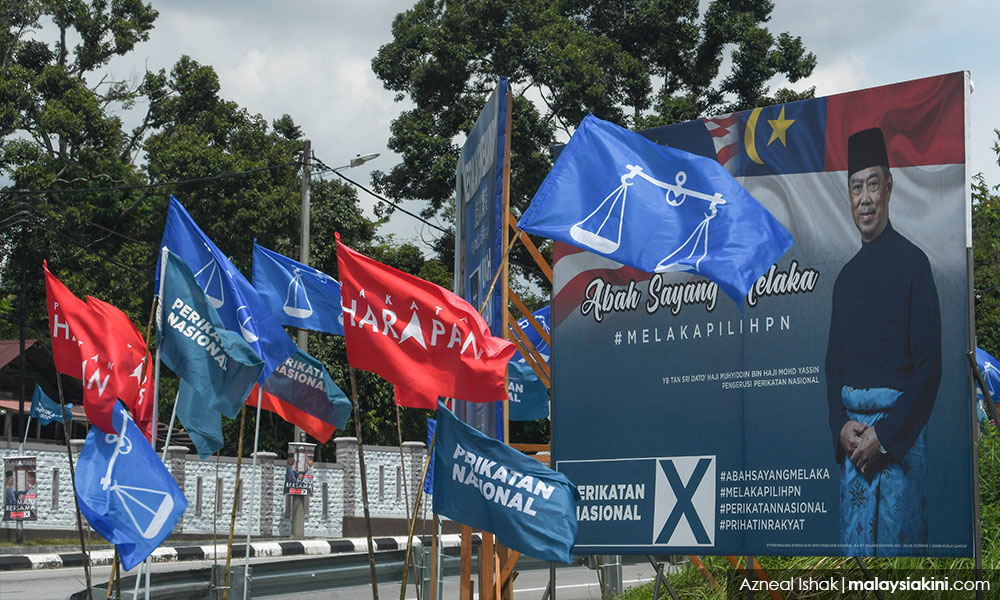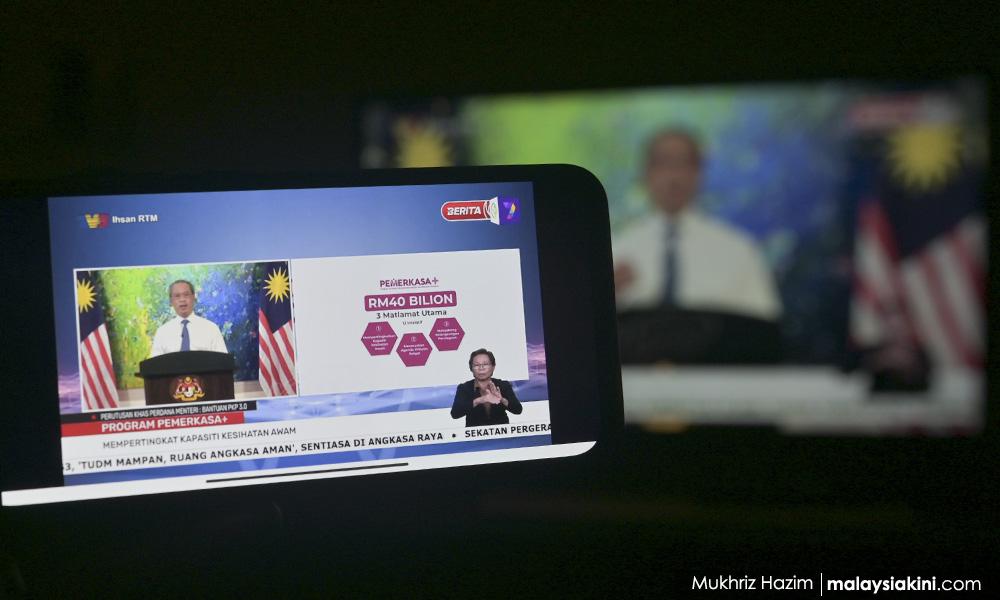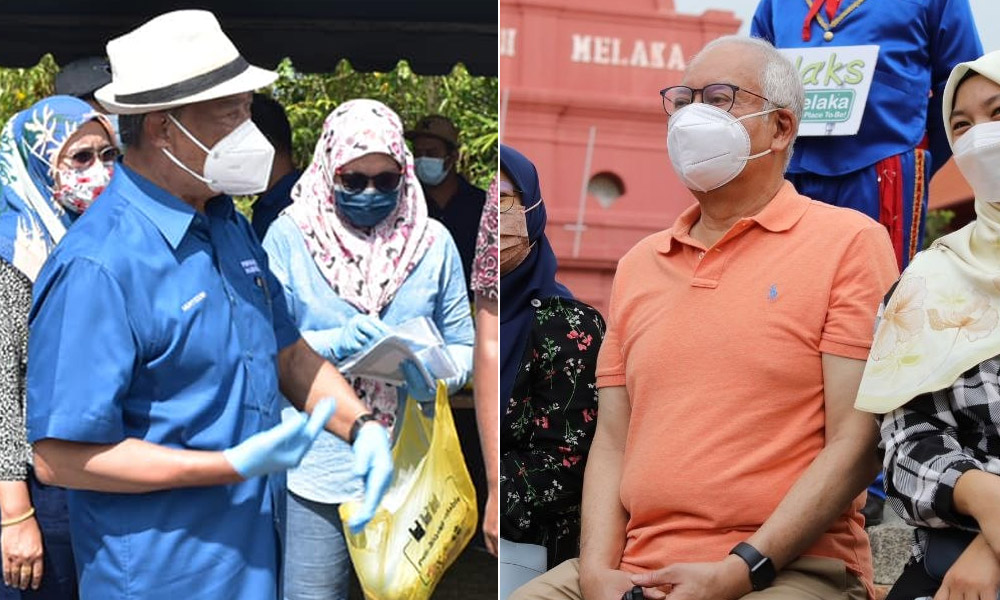On paper, Perikatan Nasional (PN) was nearly wiped out of the Malacca election with only two seats won. In reality, PN has defied all odds and emerged the largest gainer in a subdued election.
In the rural heartlands, PN is now the primary alternative to Umno, substantially eroding Pakatan Harapan's relevance. The upshot of this is profound. Harapan can no longer rely on a three-way split of Malay votes to clinch victories.
If PN becomes a serious competitor – unlike PAS in the 14th general election – Harapan would risk losing its already small Malay voter base to PN.
Understanding PN’s voter psyche is essential in devising an electoral strategy. Here are my five theories on why some voters choose PN when nobody thought they would.
1. Muhyiddin, the wartime leader
I surmise that the main draw of PN lies with former prime minister Muhyiddin Yassin. Before Muhyiddin stepped down, his popularity ratings were stubbornly high in the 70 percent range and they were consistently higher than his coalition.
PN seems to understand this; their Malacca election strategy was largely personality-driven. Posters of “Abah” were put up with a fatherly, personable message.

You would have imagined a disastrous management of the Covid-19 incident would have angered voters who would be eager to punish Muhyiddin. But the reality remains that the high airtime, leader-as-saviour bias, former-leader nostalgia, and post-disaster feel-good factor contributed to how positively voters thought of Muhyiddin.
The narrative centres on the outcome, not the process - Muhyiddin got us out of a debilitating Covid-19 nightmare, however badly he got us there.
2. Better alternative than Harapan
Most voters perceive Harapan’s 22-month administration as mired with slowness and lethargy in getting reforms through. Once again, it did not matter how difficult the process was for Harapan, voters are only concerned with the outcome.
For voters tired of the Umno-BN complex, they have not given up on looking for a credible alternative. Contrary to the popular narrative, voters did not return to BN’s fold, as their vote share remained largely unchanged.
In seats like Tanjung Bidara and Sungai Udang, it seems that more and more voters are – rightly or wrongly – approving of PN’s 17-month administration than Harapan’s 22-month tenure.
We could continue talking about Harapan’s disadvantages of poor messaging, internal sabotage, uneven prioritisation or a myriad of other reasons, but ultimately, voters seem to have more good things to say about PN’s time.
3. Covid-19 stimulus
By necessity or opportunity, Muhyiddin unveiled massive stimulus packages to get us out of the economic and health crisis. Billions were launched every few months like iPhone events, with Pemulih, Pemerkasa, and Pemerkasa Plus, and they included direct cash assistance, subsidies, loan moratoriums, and various reliefs.

Granted, the efficacy, sufficiency, and transparency of the financial assistance are debatable, but it does not erase the fact that Muhyiddin and PN’s administration were able to give out an unprecedented sum of money in recent history.
The connection between financial aid and government popularity is indisputable. Governments prefer to have elections after the budget season because the feel-good factor would often favour the incumbent. PN’s entire administration was an unencumbered and uninhibited budget season.
4. Anti-corruption stance
After multiple seasons of aggressive party-hopping, it must be strange to consider PN as less corrupt than BN. But politics nowadays seems less concerned with racing to the bottom than the lesser of two evils.
Perhaps in the minds of voters, BN is still the most corrupt because the 1MDB scandal, alongside criminal charges of BN leaders in court, felt more tangible than party-hopping and promising government positions as quid pro quo.
That is why Muhyiddin’s speeches that hammer BN for being a corrupt and immoral party carry weight. It almost did not matter that Muhyiddin’s Sheraton Move was the largest undemocratic coup; Umno orchestrated the Ismail Sabri Yaakob coup, Sabah coup, and Malacca coup.
Umno still has the stain of 1MDB; Muhyiddin is remembered for quitting Umno because of 1MDB.

A moral purist would never understand this. But moral purists do not belong in the dirty world of politics. To some voters, Muhyiddin is slightly better than former premier Najib Abdul Razak – and that was enough.
5. A low-risk coalition
The combination of Bersatu, PAS, and Gerakan is unthreatening. The combination of an indigenous rights party, a religious party, and an unintrusive multiethnic party is one that would circumvent any pre-existing anxieties of certain voter groups.
The presence of PAS, for instance, is not meant to transform the country into an Islamic state (although that is the aim of certain PAS leaders). It is meant to symbolically assure Muslims in Malaysia that the veneer of Islam will remain in government.
On the same plane, there will not be allegations of a Chinese party takeover as alleged against DAP in Harapan’s administration, because Gerakan is a submissive, almost invisible party.
After tumultuous and tiring political years, some voters are turning to a low-risk investment. They are not banking on outsized returns through high-performing leaders, they are looking for status quo and minimal mess.
I continue to be baffled by PN’s rise after thousands of lives, businesses, and jobs were lost during Muhyiddin’s administration. I hope all my speculative theories are wrong. But my worst fear is some of them are right. - Mkini
JAMES CHAI is a political analyst. He also blogs at www.jameschai.com.my and he can be reached at jameschai.mpuk@gmail.com.
The views expressed here are those of the author/contributor and do not necessarily represent the views of MMKtT.



No comments:
Post a Comment
Note: Only a member of this blog may post a comment.